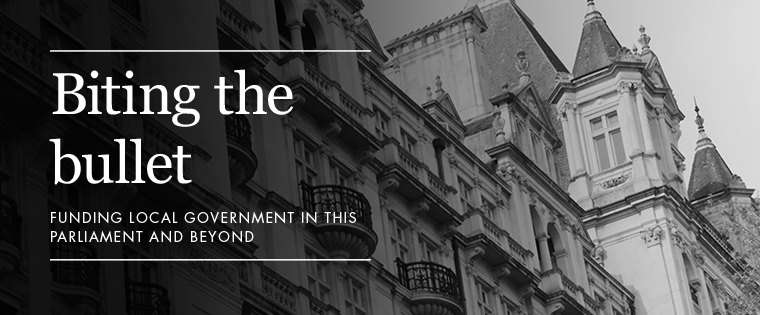Biting the Bullet
Funding local government in this Parliament and beyond
Author: Sandy Forsyth |

The financial problems facing local government in England are well rehearsed. The deteriorating impact of shrinking budgets on public services and the state of the public realm formed an important part of the Labour Party’s platform of ‘change’ in the 2024 general election campaign. Delivery of the promise to ‘fix the foundations’ and begin national renewal is urgently needed in local government, yet the challenges of doing so cannot be understated.
Biting the Bullet outlines some of the key pressures on council budgets in 2024 and provides some possible options for financial reform which, if part of wider, systemic reform, could help to restore sustainability to local government.
Key points
Crisis points in local government
The funding gap in local government is driven by a multitude of factors but, for many local authorities, the most pressing challenges come from the difficulty of budgeting for three major pressures:
- Temporary accommodation, where rising rents, cost-of-living increases, frozen housing subsidies, and a lack of social housing have led to a significant rise in TA spending, most prominent in London boroughs.
- Special Educational Needs and Disabilities (SEND) education, with increasing numbers of pupils requiring support and state school capacity issues putting a strain on austerity-hit budgets.
- Social care, as demand outpaces funding and a workforce shortage only adds further stain to the system.
Each crisis requires a mix of policy reform and financial support beyond the short-term, but each will require difficult political decisions and far-reaching vision to move to sustainable provision. Part of the programme of reform must, however, include adjustments to how local government is funded.
Options for reform
There are no quick, easy answers to heading off these crises and restoring sustainability to council finances. Steps to radical reform must be taken over the course of this Parliament, drawing on a range of options to pull together a new framework for funding councils. An important first step to reform, committed to in the Autumn Budget, is to update the formula for allocation central government grants to local authorities. The current system, with its outdated methodology, is fragmented, uncertain, and misaligned with actual needs.
Beyond updating the grant system, there are multiple options for restructuring local government finance:
- The devolution of revenue-raising powers, including the expansion of local fees and charges, could help raise small amounts of funding for place services. Likewise, new local taxes such as tourist tax or locally specific environmental levies could help to raise small amounts for targeted local expenditure.
- The uniform reform of current powers could make the system fairer and potentially increase revenues, depending on the approach taken, whether reforming business rates or revaluating council tax. The politics and practicalities of any approach would have to be balanced, given the inevitable creation of winners and losers.
- Reforming national taxes would be a more radical approach, looking at the distribution of taxes like income tax and VAT. Following international precedent, there is potential for greater local discretion and financial stability from such an approach, but it would also raise concerns about regional disparities and would require a robust redistribution system based on need.
- A further radical tax reform worth consideration is land value tax, which might provide a stable revenue source for local government whilst discouraging land speculation and promoting efficient land use.
All of these options must be considered in the construction of a new settlement, which is sorely needed to accompany systemic reform to the policy of provision across core service lines.
Prospects for this Parliament
The Autumn Budget 2024 provided a modest increase in funding for local authorities, primarily through grant funding increases aimed at heading of the worst effects of the crisis points outlined above. While welcome, this increase is insufficient to address the long-term funding gaps faced by local authorities. Despite continuing with short-term measures, there were also signals of a move towards reform, focusing on devolution, local growth, and simplifying funding structures. The prospects for genuine reform over this Parliament are therefore modest, but not insignificant:
- The budget focused on combined authorities and, representing a longer-term trend, hinted at a move towards unitary authorities. However, the fundamental problem of underfunded services cannot be solved through changes to governance structures alone.
- The reformulation and consolidation of revenue funding is crucial to the ongoing financial stability of local authorities. The announcement of such a review in the budget is therefore welcome, although the government must reckon with the requirement to increase funding – even if systems are reformed – which any genuine assessment of local need will reveal.
- The government have moved towards restructuring business rates to provide relief for certain business while ensuring local government income is unaffected. Over the course, of this Parliament, there is a chance to go further by allowing local authorities to levy additional taxes and potentially reforming council tax or exploring land value capture.
- More radical reforms, such as a new business rates system based on turnover, or devolution of a share of income tax, are unlikely in the current political climate. Nevertheless, such reforms should be argued for by proponents of better local public services and could be considered by future governments in the context of the long-term drive for national renewal.
